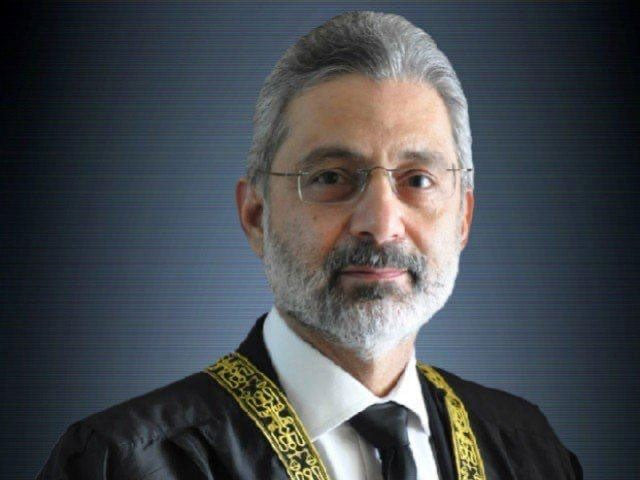Isa questions pre-emptive order on judgments law
Justice poses eight queries over eight-member larger bench’s proceedings

Supreme Court senior puisne judge Justice Qazi Faez, who has been notified as the next chief justice of Pakistan from September 17, has raised serious questions on the eight-member larger bench’s April 13 pre-emptive order suspending the effects of the SC (Practice and Procedure) Act 2013, which regulated the discretionary powers of the chief justice’s office through a committee of three senior-most judges including himself.
“The order dated April 13, 2023, which is an ad-interim ex-parte order, reads as a final decision. With respect, it is most unusual, if not unprecedented, to give categorical findings on legislation which does not exist, and to do so without hearing the other side,” read the senior puisne judge’s response to the SC registrar, who had sent him a note last month that the CJP inquired how long would Justice Isa like to remain on chamber work.
Since the enactment of the SC (Practice and Procedure) Act, Justice Isa avoided being part of a bench to hear cases. Justice Isa in a written response on the chief justice of Pakistan’s query stated that this was a question which was better answered by the top judge himself.
Justice Isa stated that an eight-member bench had proceeded to hear these petitions. However, neither of the three orders passed so far (dated April 13 2023, May 2, 2023 and May 8, 2023) attend to the registrar’s office objections, nor stated that the petitions were maintainable under Article 184(3) of the Constitution.
The SC judge posed eight questions over the eight-member larger bench’s proceedings.
First, he asked whether or not the petitions sought the enforcement of any fundamental right as none had been mentioned in any order.
Secondly, he wondered whether or not a law, which had not been enacted yet, could be suspended under Article 184(3).
He further questioned whether or not it could be further ordered that when the bill became an Act, it too shall stand suspended. “Whether [or not] at the very outset (through an ad-interim ex-parte order) the operation of a law can be suspended?” he asked.
“Whether [or not the] independence of the judiciary was threatened merely because the burden of responsibility on the Honourable Chief Justice was henceforth to be shared with two other senior judges?” he further inquired.
“Why the petitions, which were taken to be of such utmost importance and urgency, and which necessitated the passing of an ad interim ex-parte order, were then not listed for day-to-day hearing, but with a delay of 24 days?” he inquired.
He also asked whether it was appropriate for the CJP or not to hear cases pertaining to his own powers.
“Whether [or not Article IV of the Judges Code of Conduct -- ‘A judge must decline resolutely to act in a case involving his own interest’ -- was attracted; and if the petitions were to be dismissed, what will happen in the interregnum when Section 2 of the Act was not complied with?” Justice Isa inquired.
The judge noted that the oath of office of a CJP and of every judge required them to discharge their duties and perform their functions in accordance with the Constitution and its Article 189 stipulated that the decisions of the SC were binding on all other courts of Pakistan.
“The Constitution does not give pre-eminence to an ad-interim order of the Supreme Court over the oath of office, and as noted, Article 189 stipulates that decisions of the Supreme Court are only binding on other courts,” Justice Isa pointed out.
He added that on the one hand Section 2 of the Act required compliance, but on the other, this court has suspended the law’s operation.
The judge observed that the petitions would either be allowed or dismissed.
He inquired if the petitions were to be dismissed, would not conducting court in the interregnum be a violation of Section 2 of the Act.
“The chief justice and my distinguished colleagues have placed me in a quandary, which can now only be resolved when the said six petitions are decided. It is prudent to await the court’s decision. It is not for me to decide, let alone ‘like’ whether to continue with chamber work. The Hon’ble Chief Justice is much better placed to answer the question he has posed to me, since he knows better when the petitions will be decided,” Justice Isa wrote.



















COMMENTS
Comments are moderated and generally will be posted if they are on-topic and not abusive.
For more information, please see our Comments FAQ